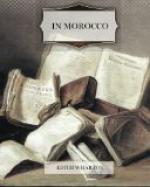Tingitanian Mauretania was one of the numerous African granaries of Rome. She also supplied the Imperial armies with their famous African cavalry, and among minor articles of exportation were guinea-hens, snails, honey, euphorbia, wild beasts, horses and pearls. The Roman dominion ceased at the line drawn between Volubilis and Sale. There was no interest in pushing farther south, since the ivory and slave trade with the Soudan was carried on by way of Tripoli. But the spirit of enterprise never slept in the race, and Pliny records the journey of a Roman general—Suetonius Paulinus—who appears to have crossed the Atlas, probably by the pass of Tizi-n-Telremt, which is even now so beset with difficulties that access by land to the Souss will remain an arduous undertaking until the way by Imintanout is safe for European travel.
The Vandals swept away the Romans in the fifth century. The Lower Empire restored a brief period of civilization; but its authority finally dwindled to the half-legendary rule of Count Julian, shut up within his walls of Ceuta. Then Europe vanished from the shores of Africa, and though Christianity lingered here and there in vague Donatist colonies, and in the names of Roman bishoprics, its last faint hold went down in the eighth century before the irresistible cry: “There is no God but Allah!”
III
THE ARAB CONQUEST
The first Arab invasion of Morocco is said to have reached the Atlantic coast, but it left no lasting traces, and the real Islamisation of Barbary did not happen till near the end of the eighth century, when a descendant of Ali, driven from Mesopotamia by the Caliphate, reached the mountains above Volubilis and there founded an empire. The Berbers, though indifferent in religious matters, had always, from a spirit of independence, tended to heresy and schism. Under the rule of Christian Rome they had been Donatists, as M. Bernard puts it, “out of opposition to the Empire”; and so, out of opposition to the Caliphate, they took up the cause of one Moslem schismatic after another. Their great popular movements have always had a religious basis, or perhaps it would be truer to say, a religious pretext, for they have been in reality the partly moral, partly envious revolt of hungry and ascetic warrior tribes against the fatness and corruption of the “cities of the plain.”
Idriss I became the first national saint and ruler of Morocco. His rule extended throughout northern Morocco, and his son, Idriss II, attacking a Berber tribe on the banks of the Oued Fez, routed them, took possession of their oasis and founded the city of Fez. Thither came schismatic refugees from Kairouan and Moors from Andalusia. The Islamite Empire of Morocco was founded, and Idriss II has become the legendary ancestor of all its subsequent rulers.




